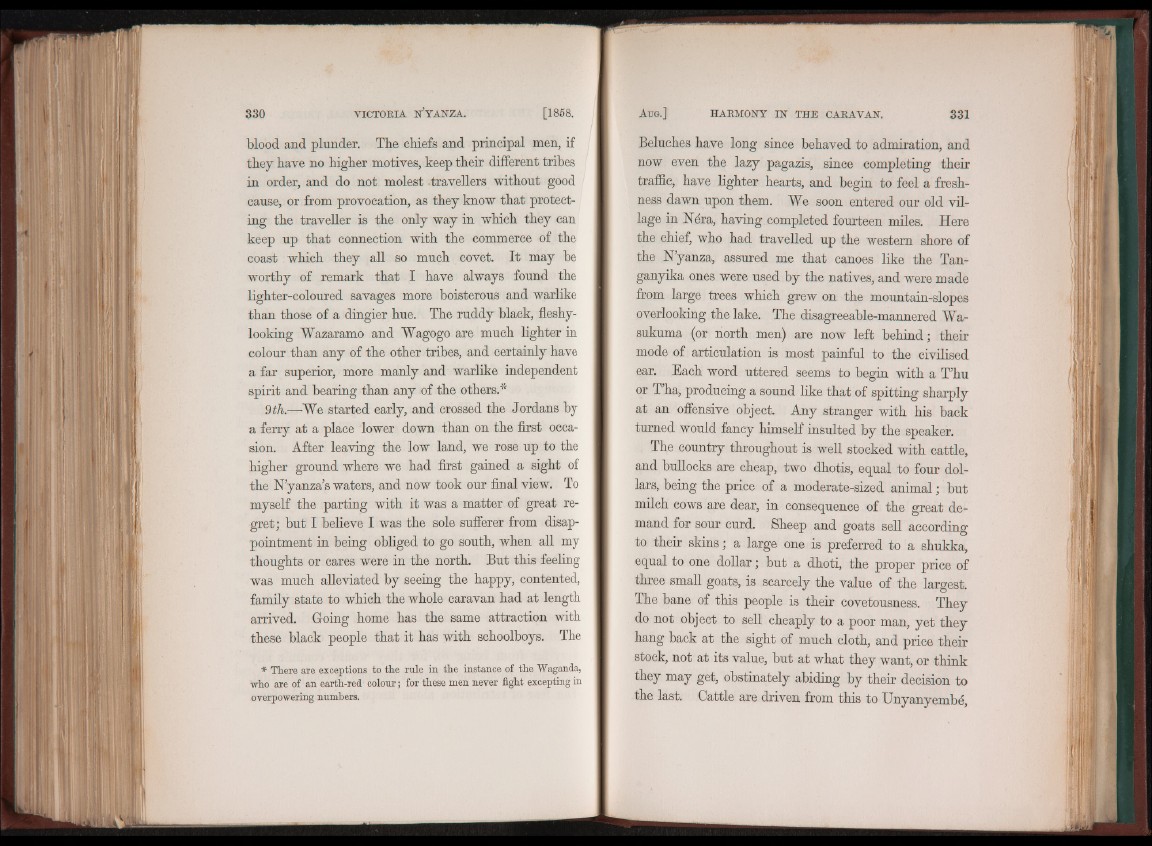
blood and plunder. The chiefs and principal men, if
they have no higher motives, keep their different tribes
in order, and do not molest .travellers without good
cause, or from provocation, as they know that protecting
the traveller is the only way in which they can
keep up that connection with the commerce of the
coast which they all so much covet. It may be
worthy of remark that I have always found the
lighter-coloured savages more boisterous and warlike
than those of a dingier hue. The ruddy black, fleshy-
1 poking Wazaramo and Wagogo are much lighter in
colour than any of the other tribes, and certainly have
a far superior, more manly and warlike independent
spirit and bearing than any of the others.*
9 th.—We started early, and crossed the Jordans by
a ferry at a place lower down than on the first occasion.
After leaving the low land, we rose up to the
higher ground where we had first gained a sight of
the N’yanza’s waters, and now took our final view. To
myself the parting with it was a matter of great regret;
but I believe I was the sole sufferer from disappointment
in being obliged to go south, when all my
thoughts or cares were in the north. But this feeling
was much alleviated by seeing the happy, contented,
family state to which the whole caravan had at length
arrived. Going home has the same attraction with
these black people that it has with schoolboys. The
* There are exceptions to the rule in the instance of the Waganda,
who are of an earth-red colour; for these men never fight excepting in
overpowering numbers.
Beluches have long since behaved to admiration, and
now even the lazy pagazis, since completing their
traffic, have lighter hearts, and begin to feel a freshness
dawn upon them. We soon entered our old village
in Néra, having completed fourteen miles. Here
the chief, who had travelled up the western shore of
the N’yanza, assured me that canoes like the Tanganyika
ones were used by the natives, and were made
from large trees which grew on the mountain-slopes
overlooking the lake. The disagreeable-mannered Wa-
sukuma (or north men) are now left behind; their
mode of articulation is most painful to the civilised
ear. Each word uttered seems to begin with a T’hu
or T ha, producing a sound like that of spitting sharply
at an offensive object. Any stranger with his back
turned would fancy himself insulted by the speaker.
The country throughout is well stocked with cattle,
and bullocks are cheap, two dhotis, equal to four dollars,
being the price of a moderate-sized animai ; but
milch cows are dear, in consequence of the great demand
for sour curd. Sheep and goats sell according
to their skins; a large one is preferred to a shukka,
equal to one dollar ; but a dhoti, the proper price of
three small goats, is scarcely the value of the largest.
The bane of this people is their covetousness. They
do not object to sell cheaply to a poor man, yet they
hang back at the sight of much cloth, and price their
stock, not at its value, but at what they want, or thinb-
they may get, obstinately abiding by their decision to
the last. Cattle are driven from this to Unyanyembe,